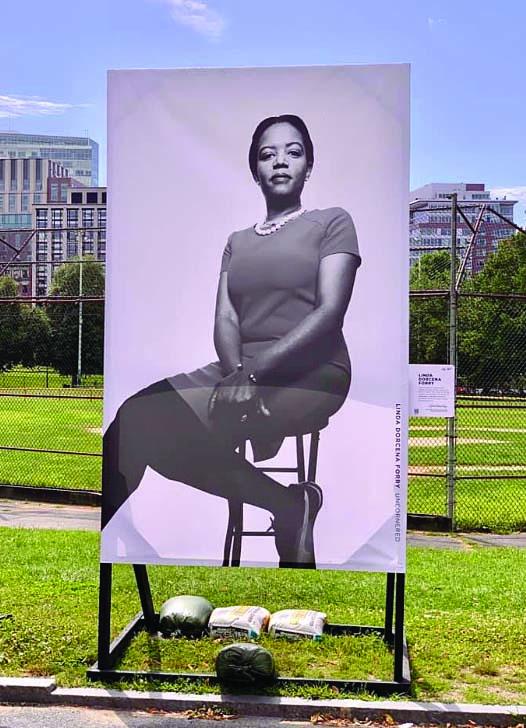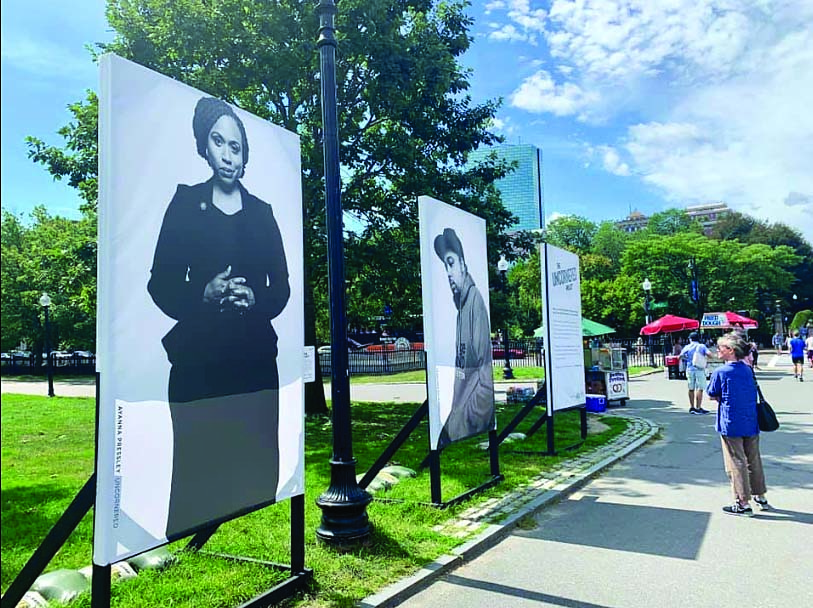September 5, 2019

Portraits of former state Sen. Linda Dorcena Forry and US Rep. Ayanna Pressley line the walkways of Boston Common.
Two men met in a prison cell in 2009, doing time for different crimes. Elias Perea grew up in Dorchester. So did Luis Rodrigues. They hailed from different neighborhoods, each a member of a different gang. But when life backed them into a corner, they built a friendship. Rodrigues saw the good in him, Perea said.
Now a photo installation is giving the broader public a closer look at the way these former gang members changed their lives for the better. Their faces and stories are among more than two dozen vignettes that began to dot Boston Common last week as as part of a public art exhibit called the Uncornered Photo Documentary Project.
Both Perea and Rodrigues now work as college-readiness advisers encouraging young people to leave gangs and go back to school through the Boston Uncornered program at nonprofit College Bound Dorchester.
Sometimes, Perea can’t believe this is his job. He assumed his picture would one day be on a T-shirt next to the words “Rest in Peace,” another victim of violent crime. But now his likeness will be highlighted on one of Boston’s most traversed green spaces. In the photo, Perea looks straight at the camera, confident. His hair is braided. He hasn’t cut it since he was 15 or 16 — in honor of a friend who was shot and killed. He says that his hair was his strength.
“It’s like I’m standing strong,” he said. “And [it shows that] you can stand strong, you can stand on your own two feet no matter what you go through.”
The black and white portraits are larger than life, at least eight feet tall, and will eventually stand in a row of frames across the Common. They feature College Bound Dorchester staff, former gang members turned students, and politicians, including Boston Mayor Marty Walsh, US Rep. Ayanna Pressley, and former state Sen. Linda Dorcena Forry.

Photographer John Huet wanted to give a glimpse of a universal experience: the feeling of being cornered and overcoming a negative narrative whether racism, trauma, or judgment.
“I tried to the best of my ability not to even talk to the person I’m photographing about their ‘uncornered’ moment,” Huet said. “But I asked them to think about it, to kind of put their mind at that point where they decided to change their lives.”
He said that expression on each of their faces, that moment of pause and determination is what he wanted to capture. In his story for the exhibit, the mayor touches on how he overcame alcoholism:
“I am not defined by my alcoholism, but by my recovery. It gave me a second chance to rebuild my life. My recovery and the support I received along the way ‘uncornered’ me and gave me the opportunity to live out my dream of being Mayor of the greatest city in America.”
Perea spoke about serving his second sentence:
“On my second bid, years after my first, I saw the same dudes, still locked up doing the same things as when I was just a youngin’. That’s when I realized couldn’t be a lifer with nothing to look forward to. I wanted my own life and became ‘uncornered’”
The Boston Uncornered program was an innovative if controversial idea that first began several years ago. The program provides a weekly $400 stipend to certain students as they pursue degrees. Michelle Caldeira, senior vice president of College Bound Dorchester whose portrait is also featured, hopes the photographs allow people to identify with the students.
“We’re hoping that people will see the exhibit ... and be able to look inside themselves and be a little bit reflective,” said Caldeira. “Well, what’s my ‘uncornered moment’ and what did that look like for me?”
Over three years, the program has connected with 500 former gang members. They have seen nearly 100 students begin receiving stipends and pursue their studies.
Perea understands why some guys don’t trust anyone, why they’re hesitant to open up, and why many return to the streets. The now 41-year-old Perea struggled after prison because “nobody wanted to hire a felon.” He served time twice, the first for three years, and the second time for five years. It was Rodrigues who recommended he try College Bound Dorchester’s program.
“I thought it was gonna be hard because, ‘OK, now I gotta build relationships with the guys and talk to them, coach them,’” Perea said. “But then it was like, ‘Wait a minute, I’ve been through it.’ So then who better to coach somebody?”
His work is similar to that of a social worker, helping students socially and emotionally, supporting their search for a life they never expected to have. Still, it’s difficult to forget his past, to not constantly look over his shoulder.
Two years ago in 2017, Perea was shot while talking to some guys at College Bound Dorchester. Later, alone in a hospital bed, he remembers his anger surging. He wanted payback. Perea calls that moment a test he never knew he needed. He took a bullet in the abdomen meant for someone else, another young person in the program.
“Imagine if I had just gone back to the streets. They would’ve said, ‘Hold on, I’m gonna do the same thing you’re doing,’ “ Perea said. “I didn’t let this situation take me backwards ... I’m grateful that I didn’t die in that hallway.”
In a lifetime of loss and anger, he’s proud of the life he’s created for himself. Huet says he hopes Perea’s story inspires others.
“If we get one person who reads any one of these stories and says, ‘You know what? I gotta change the direction I’m going in,” Huet said. “I think that’s my goal.”


